| Listing 1 - 8 of 8 |
Sort by
|
Book

ISBN: 3110682427 3110682281 Year: 2021 Publisher: De Gruyter
Abstract | Keywords | Export | Availability | Bookmark
 Loading...
Loading...Choose an application
- Reference Manager
- EndNote
- RefWorks (Direct export to RefWorks)
Die für die moderne chinesische Geschichte charakteristische Verbindung von Kultur und Politik gewinnt in der Bewegung des 4. Mai 1919 ihren ersten prägnanten Ausdruck. Die Beiträge des vorliegenden Bandes blicken in unterschiedlichen Perspektiven auf den chinesisch-deutschen Ideenaustausch, der die jene Bewegung kennzeichnende Kontroverse zwischen chinesischer Überlieferung und westlicher Moderne begleitete und nicht selten inspirierte. The union of culture and politics that is so characteristic of modern Chinese history gained its first concise expression in the May Fourth Movement of 1919. The essays in this edited volume examine the exchange of ideas between China and Germany from various perspectives, illuminating how the clash between Chinese tradition and Western modernity accompanied and often inspired the movement.
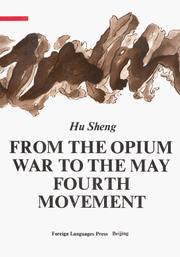
ISBN: 7119000020 711900008X 9787119000084 9787119000022 Year: 1991 Publisher: Beijing: Foreign languages press,
Abstract | Keywords | Export | Availability | Bookmark
 Loading...
Loading...Choose an application
- Reference Manager
- EndNote
- RefWorks (Direct export to RefWorks)
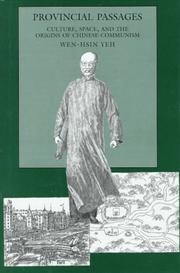
ISBN: 0520916328 0585104328 9780520916326 9780585104324 0520200683 9780520200685 Year: 1996 Publisher: Berkeley ; Los Angeles ; London University of California Press
Abstract | Keywords | Export | Availability | Bookmark
 Loading...
Loading...Choose an application
- Reference Manager
- EndNote
- RefWorks (Direct export to RefWorks)
Revealing information that has been suppressed in the Chinese Communist Party's official history, Wen-hsin Yeh presents an insightful new view of the Party's origins. She moves away from an emphasis on Mao and traces Chinese Communism's roots to the country's culturally conservative agrarian heartland. And for the first time, her book shows the transformation of May Fourth radical youth into pioneering Communist intellectuals from a social and cultural history perspective. Yeh's study provides a unique description of the spatial dimensions of China's transition into modernity and vividly evokes the changing landscapes, historical circumstances, and personalities involved. The human dimension of this transformation is captured through the biography of Shi Cuntong (1899-1970), a student from the Neo-Confucian county of Jinhua who became a founding member of the Party. Yeh's in-depth analysis of the dynamics of change is combined with a compelling narrative of the moral dilemmas in the lives of Shi Cuntong and other early leaders. Using sources previously closed to scholars, including recently discovered documents in the archives of the First United Front, Yeh shows the urban Communist movement as an intellectual revolution in social consciousness. The Maoist legacy has often been associated with the excesses of the Cultural Revolution. Yeh's historical reconstruction of a pre-Mao, non-organizational dimension of Chinese socialism is thus of vital interest to those seeking to redefine the place of the Communist Party in a post-Mao political order.
Intellectuals --- Communism --- Regions & Countries - Asia & the Middle East --- History & Archaeology --- East Asia --- Bolshevism --- Communist movements --- Leninism --- Maoism --- Marxism --- Trotskyism --- Collectivism --- Totalitarianism --- Post-communism --- Socialism --- Village communities --- Intelligentsia --- Persons --- Social classes --- Specialists --- Zhejiang Sheng (China) --- China --- History. --- History --- Politics and government --- S05/0228 --- S06/0405 --- China: Biographies and memoirs--Other political leaders --- China: Politics and government--CCP, history and ideology: general --- E-books --- Chekiang Province (China) --- May Fourth Movement, 1919 --- Chekiang Province (China) - History. --- China - History - May Fourth Movement, 1919.
Book
ISBN: 9789578654051 9578654057 Year: 2018 Publisher: Xinbei Shi : Ba qi wen hua,
Abstract | Keywords | Export | Availability | Bookmark
 Loading...
Loading...Choose an application
- Reference Manager
- EndNote
- RefWorks (Direct export to RefWorks)
Influence (Literary, artistic, etc.). --- Nationalism. --- Peace. --- World War, 1914-1918 --- Influence. --- Wilson, Woodrow, --- British Occupation of India (1765-1947). --- Independence Movement (Korea : 1919). --- Insurrection (Egypt : 1919). --- May Fourth Movement (China : 1919). --- World War (1914-1918). --- 1765-1947. --- China --- China. --- Egypt --- Egypt. --- India --- India. --- Korea --- Korea. --- History
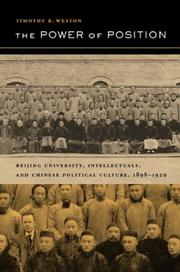
ISBN: 9786612357077 1282357077 052092990X 1597348287 9780520929906 1417525673 9781417525676 9781597348287 661235707X 0520237676 9780520237674 9781282357075 Year: 2004 Publisher: Berkeley University of California Press
Abstract | Keywords | Export | Availability | Bookmark
 Loading...
Loading...Choose an application
- Reference Manager
- EndNote
- RefWorks (Direct export to RefWorks)
Throughout the twentieth century, Beijing University (or Beida) has been at the center of China's greatest political and cultural upheavals-from the May Fourth Movement of 1919 to the Cultural Revolution of the 1960's to the tragic events in Tiananmen Square in 1989. Why this should be-how Beida's historical importance has come to transcend that of a mere institution of higher learning--is a question at the heart of this book. A study of intellectuals and political culture during the past century's tumultuous early decades, The Power of Position is the first to focus on Beida, China's oldest and best-known national university. Timothy B. Weston portrays the university as a key locus used by intellectuals to increase their influence in society. Weston analyzes the links between intellectuals' political and cultural commitments and their specific manner of living. He also compares Beijing's intellectual culture with that of the rising metropolis of Shanghai. What emerges is a remarkably nuanced and complex picture of life at China's leading university, especially in the decades leading up to the May Fourth Movement.
Political culture --- Higher education and state --- Education, Higher --- State and higher education --- Education and state --- History. --- Government policy --- Beijing da xue --- Jing shi da xue tang (Beijing, China) --- Pei-ching ta hsüeh --- National University of Peking --- Metropolitan University (Beijing, China) --- Universität Peking --- Beijing (China). --- Guo li Beijing da xue --- Bei jing da xue --- Peking University --- Université de Pékin --- Beijing University --- Kokuritsu Pekin Daigaku --- Pei ta (China) --- Universität Beijing --- Pekinger Reichsuniversitaet --- Pukkyŏng Taehak --- Begejing Yeke Surġaġuli --- Universitas Peking --- 北京大〓 --- 北京大学 --- 北京大學 --- 國立北京大學 --- S02/0210 --- S11/0708 --- S11/0709 --- S14/0200 --- S14/0400 --- History --- China: General works--Intellectuals: general and before 1840 --- China: Social sciences--Elite --- China: Social sciences--Cadres (incl. political commissars) --- China: Education--General works --- China: Education--Modern education: before 1949 (incl. Modern intellectual trends) --- academia. --- beida. --- beijing university. --- beijing. --- china. --- chinese anarchism. --- chinese culture. --- chinese history. --- chinese intellectuals. --- chinese republic. --- chinese students. --- citizenship. --- college campus. --- college. --- cultural revolution. --- democracy. --- free speech. --- higher education. --- history. --- intellectual culture. --- may fourth movement. --- national university. --- nonfiction. --- peoples republic. --- politics. --- protest. --- rebellion. --- resistance. --- shanghai. --- social change. --- social influence. --- social standing. --- student protest. --- student. --- tiananmen square. --- university.
Book
ISBN: 9781592651207 Year: 2012 Publisher: South San Francisco (Cal.) : Long River Press,
Abstract | Keywords | Export | Availability | Bookmark
 Loading...
Loading...Choose an application
- Reference Manager
- EndNote
- RefWorks (Direct export to RefWorks)
early feudal China --- mythology --- Qin Dynasty --- philosophy --- divine right --- Xia culture --- Shang culture --- Zhou culture --- atheism --- dialectics --- the Confucian canon --- Buddhist philosophy --- Fan Zhen --- the Sui-Tang period --- Confucian orthodoxy --- Han Yu --- Li Ao --- 'The Art of War' --- cognitive theory --- the philosophy of Confucius --- ideology --- the Mohist School --- Daoism --- nature --- the philosophy of Laozi --- Mencius --- the Confucian tradition --- Zhuangzi --- Daoist philosophy --- natural philosophy --- logical theory --- schools of thought --- legalism in pre-Qin China --- Zou Yan --- the Book of Changes --- philosophy in early feudal China --- the Golden Age --- philosophical trends of the Qin-Han transition --- Han ideology --- Wang Chong --- naïve dialectics --- metaphysics --- the Three Kingdoms Period --- the Western Jin Dynasty --- the Confucian canon --- Buddhist philosophy --- Fan Zhen --- the Sui-Tang period --- Confucian orthodoxy --- Han Yu --- Li Ao --- Northern Song dynasty --- Ming Dynasty --- neo-Confucianism --- Wang Anshi --- Zhang Zai --- Zhu Xi --- Lu Jiuyuan --- Chen Liang --- Ye Shi --- Wang Shouren --- Wang Tingxiang --- contemporary China --- Huang Zongxi --- Fang Yizhi --- Wang Fuzhi --- Yan Yuan --- Dai Zhen --- the Opium War --- the Taiping Rebellion --- the Reform Movement of 1898 --- the Revolution of 1911 --- the May Fourth Movement --- Marxist philosophy --- confucianism --- buddhism
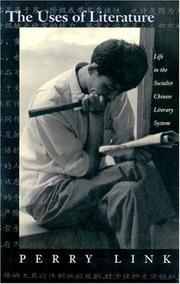
ISBN: 0691001987 0691227845 0691001979 Year: 2000 Publisher: Princeton (N.J.) : Princeton university press,
Abstract | Keywords | Export | Availability | Bookmark
 Loading...
Loading...Choose an application
- Reference Manager
- EndNote
- RefWorks (Direct export to RefWorks)
Why do people in socialist China read and write literary works? Earlier studies in Western Sinology have approached Chinese texts from the socialist era as portraits of society, as keys to the tug-of-war of dissent, or, more recently, as pursuit of "pure art." The Uses of Literature looks broadly and empirically at these and many other "uses" of literature from the points of view of authors, editors, political authorities, and several kinds of readers. Perry Link, author of Evening Chats in Beijing, considers texts ranging from elite "misty" poetry to underground hand-copied volumes (shouchauben) and shows in concrete detail how people who were involved with literature sought to teach, learn, enjoy, explore, debate, lead, control, and resist. Using the late 1970s and early 1980s as an entree to the workings of China's "socialist literary system," the author shows how that system held sway from 1950 until around 1990, when an encroaching market economy gradually but fundamentally changed it. In addition to providing a definitive overview of how the socialist Chinese literary system worked, Link offers comparisons to the similar system in the Soviet Union. In the final chapter, the book seeks to explain how the word "good" was used and understood when applied to literary works in such systems. Combining aspects of cultural and literary studies, The Uses of Literature will reward anyone interested in the literature of modern China or how creativity is affected by a "socialist literary system."
S16/0170 --- S16/0195 --- S06/0436 --- China: Literature and theatrical art--General works on modern literature --- China: Literature and theatrical art--Thematic studies --- China: Politics and government--Policy towards literature and art --- Chinese literature --- 20th century --- History and criticism --- Socialism and literature --- China --- Literature and society --- LITERARY CRITICISM / Asian / Chinese --- Litterature et societe --- Socialisme et litterature --- Litterature chinoise --- Chinesisch --- Politik --- Gesellschaft --- Literatur --- Sozialismus --- Socialism and literature. --- Literature and society. --- Chinese literature. --- Histoire et critique. --- History and criticism. --- China. --- Chinesisch. --- Akhmatova, Anna. --- Alyoshin, Samuil. --- Anhui province. --- Bai Hua. --- Bai Xianyong. --- Bell Tower Society. --- Bureau of Drama Reform. --- Cao Guanlong. --- Cao Xueqin. --- Chen Guokai. --- Chinese Academy of Sciences. --- Chinese Progress (journal). --- Christianity. --- Confucius. --- Dai minority people. --- Democracy Wall. --- Ehrenburg, Ilya. --- Fadeyev, Alexander. --- Feng Menglong. --- Gao Xiaosheng. --- Guo Moruo. --- Han Shaogong. --- Heavy Wings (Zhang Jie). --- Hiroshima. --- Hu Yaobang. --- Jiang Zilong. --- Jin Jingmai. --- Khrushchev Remembers. --- Khrushchev, Nikita. --- Kong Jiesheng. --- Li Yingru. --- Mao Zedong. --- Marxism-Leninism. --- May Fourth movement. --- Napoleon. --- Paustovsky, Konstantin. --- alienation. --- bookstores. --- bureaucratism. --- calligraphy. --- cartoonists. --- conservatives. --- corruption. --- decadence. --- democracy. --- engineering, literary. --- existentialism. --- feudalism. --- filmscripts. --- liberalism. --- neorealism. --- pluralism. --- Literature and socialism --- Literature --- Literature and sociology --- Society and literature --- Sociology and literature --- Sociolinguistics --- Social aspects --- Cina --- Kinë --- Cathay --- Chinese National Government --- Chung-kuo kuo min cheng fu --- Republic of China (1912-1949) --- Kuo min cheng fu (China : 1912-1949) --- Chung-hua min kuo (1912-1949) --- Kina (China) --- National Government (1912-1949) --- China (Republic : 1912-1949) --- People's Republic of China --- Chinese People's Republic --- Chung-hua jen min kung ho kuo --- Central People's Government of Communist China --- Chung yang jen min cheng fu --- Chung-hua chung yang jen min kung ho kuo --- Central Government of the People's Republic of China --- Zhonghua Renmin Gongheguo --- Zhong hua ren min gong he guo --- Kitaĭskai︠a︡ Narodnai︠a︡ Respublika --- Činská lidová republika --- RRT --- Republik Rakjat Tiongkok --- KNR --- Kytaĭsʹka Narodna Respublika --- Jumhūriyat al-Ṣīn al-Shaʻbīyah --- RRC --- Kitaĭ --- Kínai Népköztársaság --- Chūka Jinmin Kyōwakoku --- Erets Sin --- Sin --- Sāthāranarat Prachāchon Čhīn --- P.R. China --- PR China --- PRC --- P.R.C. --- Chung-kuo --- Zhongguo --- Zhonghuaminguo (1912-1949) --- Zhong guo --- Chine --- République Populaire de Chine --- República Popular China --- Catay --- VR China --- VRChina --- 中國 --- 中国 --- 中华人民共和国 --- Jhongguó --- Bu̇gu̇de Nayiramdaxu Dundadu Arad Ulus --- Bu̇gu̇de Nayiramdaqu Dumdadu Arad Ulus --- Bu̇gd Naĭramdakh Dundad Ard Uls --- BNKhAU --- БНХАУ --- Khi︠a︡tad --- Kitad --- Dumdadu Ulus --- Dumdad Uls --- Думдад Улс --- Kitajska --- China (Republic : 1949- ) --- Sozialistisches Gesellschaftssystem --- Gesellschaftsordnung --- Kommunismus --- Sozialistische Bewegung --- Sozialist --- Belletristik --- Dichtung --- Schöne Literatur --- Sprachkunst --- Wortkunst --- Buch --- Schriftsteller --- Sein --- Staatspolitik --- Politische Lage --- Politische Entwicklung --- Politische Situation --- Guoyu --- Kuo-yü --- Putonghua --- P'u-t'ung-hua --- Mandarin --- Guanhua --- Kuanhua --- Nationalsprache --- Sinotibetische Sprachen --- Littérature et socialisme --- Communisme et littérature --- Marxisme et littérature --- Politique et littérature --- Socialisme et culture --- Littérature --- Société et littérature --- Femmes et littérature --- Littérature et géographie --- Littérature postcoloniale --- Sociologie de la littérature --- Vie littéraire --- Féminisme et littérature --- Institution littéraire --- Psychologie sociale et littérature --- Aspect social --- 1949 --- -BNKhAU --- Chung-hua min kuo --- Jhonggu --- Khi͡atad --- Kin --- Kita --- Kitaĭskai͡a Narodnai͡a Respublika --- National Government --- Republic --- Republic of China --- Zhonghuaminguo --- Rotchina --- Zhongguo-Diguo --- Kaiserreich Zhongguo --- Zhonghua-minguo --- Chung-hua-min-kuo --- Zhonghua-Renmin-Gongheguo --- Kaiserreich China --- Shinkoku --- Chung-hua-jen-min-kung-ho-kuo --- Zhonghua --- Volksrepublik China --- Zhonghua renmin gongheguo --- République populaire de Chine --- Kytajsʹkaja Narodnaja Respublika --- Chinese People’s Republic --- Chinesen --- Taiwan
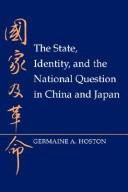
ISBN: 0691023344 0691078734 0691225419 9780691023342 9780691078731 Year: 1994 Publisher: Princeton (N.J.): Princeton university press,
Abstract | Keywords | Export | Availability | Bookmark
 Loading...
Loading...Choose an application
- Reference Manager
- EndNote
- RefWorks (Direct export to RefWorks)
The first decades of the twentieth century witnessed an explosion of nationalist sentiment in East Asia, as in Europe. This comprehensive work explores how radical Chinese and Japanese thinkers committed to social change in this turbulent era addressed issues concerning national identity, social revolution, and the role of the national state in achieving socio-economic development. Focusing on the adaptation of anarchism and then Marxism-Leninism to non-European contexts, Germaine Hoston shows how Chinese and Japanese theorists attempted to reconcile a relatively new appreciation for the nation-state with their allegiance to a vision of internationalist socialist revolution culminating in stateless socialism. Given the influence of Western experience on Marxism, Chinese and Japanese theorists found the Marxian national question to be not merely one of whether the "working man has no country," but rather the much more fundamental issue of the relative value of Eastern and Western cultures. Marxism, argues Hoston, thus placed native Marxists in tension with their own heritage and national identity. The author traces efforts to resolve this tension throughout the first half of the twentieth century, and concludes by examining how the tension persists, as Chinese and Japanese dissidents seek identity-affirming modernity in accordance with the Western democratic model.
Communism --- Communisme --- China --- Japan --- Chine --- Japon --- Politics and government --- Politique et gouvernement --- S02/0100 --- -Communism --- -Bolshevism --- Communist movements --- Leninism --- Maoism --- Marxism --- Trotskyism --- Collectivism --- Totalitarianism --- Post-communism --- Socialism --- Village communities --- China: General works--China (and Asia) general surveys: before 1949 --- -Politics and government --- -China: General works--China (and Asia) general surveys: before 1949 --- -S02/0100 --- Nihon --- Nippon --- Iapōnia --- Zhāpān --- I︠A︡ponii︠a︡ --- Yapan --- Japão --- Japam --- Mư̄ang Yīpun --- Prathēt Yīpun --- Yīpun --- Jih-pen --- Riben --- Government of Japan --- Cina --- Kinë --- Cathay --- Chinese National Government --- Chung-kuo kuo min cheng fu --- Republic of China (1912-1949) --- Kuo min cheng fu (China : 1912-1949) --- Chung-hua min kuo (1912-1949) --- Kina (China) --- National Government (1912-1949) --- China (Republic : 1912-1949) --- People's Republic of China --- Chinese People's Republic --- Chung-hua jen min kung ho kuo --- Central People's Government of Communist China --- Chung yang jen min cheng fu --- Chung-hua chung yang jen min kung ho kuo --- Central Government of the People's Republic of China --- Zhonghua Renmin Gongheguo --- Zhong hua ren min gong he guo --- Kitaĭskai︠a︡ Narodnai︠a︡ Respublika --- Činská lidová republika --- RRT --- Republik Rakjat Tiongkok --- KNR --- Kytaĭsʹka Narodna Respublika --- Jumhūriyat al-Ṣīn al-Shaʻbīyah --- RRC --- Kitaĭ --- Kínai Népköztársaság --- Chūka Jinmin Kyōwakoku --- Erets Sin --- Sin --- Sāthāranarat Prachāchon Čhīn --- P.R. China --- PR China --- Chung-kuo --- Zhongguo --- Zhonghuaminguo (1912-1949) --- Zhong guo --- République Populaire de Chine --- República Popular China --- Catay --- VR China --- VRChina --- 中國 --- 中国 --- 中华人民共和国 --- Jhongguó --- Bu̇gu̇de Nayiramdaxu Dundadu Arad Ulus --- Bu̇gu̇de Nayiramdaqu Dumdadu Arad Ulus --- Bu̇gd Naĭramdakh Dundad Ard Uls --- Khi︠a︡tad --- Kitad --- Dumdadu Ulus --- Dumdad Uls --- Думдад Улс --- Kitajska --- Politische Identität --- Kommunismus --- Nationalismus --- Nationalbewusstsein. --- Marxismus. --- Japan. --- China. --- al-Yābān --- Giappone --- Japani --- Japonia --- Japonsko --- Japonya --- Nihon-koku --- Nihonkoku --- Nippon-koku --- Nipponkoku --- State of Japan --- Yābān --- Япония --- اليابان --- يابان --- 日本 --- 日本国 --- PRC --- P.R.C. --- BNKhAU --- БНХАУ --- China (Republic : 1949- ) --- Activism. --- Agriculture (Chinese mythology). --- Anarchism. --- Anti-imperialism. --- Antonio Gramsci. --- Asiatic mode of production. --- Backwardness. --- Base and superstructure. --- Bolsheviks. --- Bourgeoisie. --- Buddhism. --- Capitalism. --- Capitalist state. --- Chinese nationalism. --- Class conflict. --- Communism. --- Communist International. --- Communist Party of China. --- Communist revolution. --- Communist society. --- Confucianism. --- Counter-revolutionary. --- Criticism. --- Despotism. --- Dictatorship. --- Feudalism. --- For Marx. --- Hegemony. --- Historical materialism. --- Ideology. --- Imperialism. --- Industrialisation. --- Intellectual. --- Japanese Communist Party. --- Japanese nationalism. --- Karl Kautsky. --- Kokutai. --- Kuomintang. --- Labour movement. --- Left-wing politics. --- Legitimacy (political). --- Leninism. --- Leon Trotsky. --- Li Dazhao. --- Mao Zedong. --- Maoism. --- Marx's theory of the state. --- Marxian economics. --- Marxism. --- Marxism–Leninism. --- Marxist philosophy. --- May Fourth Movement. --- Meiji Restoration. --- Meiji period. --- Mode of production. --- Modernity. --- Narodniks. --- Nation state. --- Nationalism. --- Nationality. --- Nikolai Bukharin. --- Orthodox Marxism. --- Political party. --- Political philosophy. --- Political science. --- Politics. --- Populism. --- Proletarian revolution. --- Radicalism (historical). --- Regime. --- Revolutionary movement. --- Revolutionary socialism. --- Russian Revolution. --- Second International. --- Slavery. --- Social class. --- Social democracy. --- Social revolution. --- Socialism with Chinese characteristics. --- Socialist state. --- Sovereignty. --- Soviet Union. --- Stalinism. --- State (polity). --- State capitalism. --- State socialism. --- Statism. --- Sun Yat-sen. --- The Communist Manifesto. --- Trade union. --- Trotskyism. --- Vanguardism. --- Wars of national liberation. --- Western Europe. --- Western world. --- Withering away of the state. --- World War II. --- World revolution. --- Writing. --- Communism - Asia --- Communism - China --- Communism - Japan --- Japan - Politics and government - 1926-1945 --- China - Politics and government - 1912-1949 --- Jepun --- Yapon --- Yapon Ulus --- I︠A︡pon --- Япон --- I︠A︡pon Uls --- Япон Улс --- Nationalbewegung --- Nationalbewusstsein --- Patriotismus --- Marxismus --- Marxismus-Leninismus --- Sozialismus --- Antikommunismus --- Kommunist --- Anarchokommunismus --- Nationale Identität --- Historische Identität --- Identität --- Rotchina --- Zhongguo-Diguo --- Kaiserreich Zhongguo --- Zhonghua-minguo --- Chung-hua-min-kuo --- Zhonghua-Renmin-Gongheguo --- Kaiserreich China --- Shinkoku --- Chung-hua-jen-min-kung-ho-kuo --- Zhonghua --- Volksrepublik China --- Zhonghua renmin gongheguo --- République populaire de Chine --- Kytajsʹkaja Narodnaja Respublika --- Chinese People’s Republic --- Republic of China --- Chung-hua min kuo --- Chinesen --- Taiwan --- Empire du Japon --- Zen-Nihon --- Zenkoku --- Dainihon --- Dainippon --- Japão --- Japaner
| Listing 1 - 8 of 8 |
Sort by
|

 Search
Search Feedback
Feedback About UniCat
About UniCat  Help
Help News
News